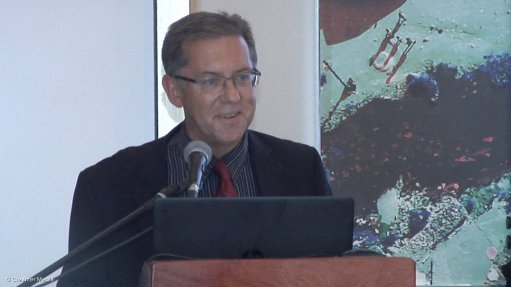
Professor Eugene Cloete
A newly released study has identified policy certainty and coherence as a “critical enabling factor” for the accelerated adoption and roll-out of green technologies across various industry subsectors in South Africa, including the coal-heavy electricity sector.
Entitled ‘The State of Green Technologies in South Africa’, the study was commissioned by the Department of Science and Technology (DST) and drafted by a panel of experts assembled, on a voluntary basis, under the aegis of the Academy of Science of South Africa (Assaf).
Assaf is the country’s official science academy, which seeks to offer evidence-based scientific advice to government.
The 236-page document, which was released in Johannesburg on Wednesday, would serve as a reference document for policymakers, as well as green-technology practitioners and was expected to influence the choices made in sectors as diverse as waste management through to mining and agriculture.
Panel chairperson Professor Eugene Cloete said that South Africa was still lagging in the uptake of green technologies, and cautioned that a lack of clarity in policy direction, or shifts in government thinking, could be an inhibiting factor.
The report made specific reference to the shift in planned implementation date of the future nuclear build programme, arguing that, in light of the “enormous investments required” policy shifts even in the form of delayed implementation “pose risks”.
“Policy coherence is equally important,” the report states, arguing that clear targets and alignment in policies between different government departments was imperative.
“Lack of policy coordination between government departments or between departments and agencies hinders implementation,” it added, highlighting the confusion caused in the renewable-energy sector when a competitive-bidding process replaced the proposed feed-in tariff model.
Other recommendations made by the report’s authors included:
- A prioritisation of niche technology areas for local development in a way that maximised synergies with the country’s current industrial capabilities.
- Government playing a role in actively shaping the market through supportive research and development, training and financial incentive schemes.
- Embracing strategies to upskill or retool the South Africa workforce for green technologies, as well as ensuring that technology transfer explicitly includes the transfer of skills and skills development.
- Ensuring that market demand is not neglected in favour of a focus on the supply-side of green technologies.
- Ensuring that South Africa’s development needs inform and direct but do not prescribe investment strategies.
- Initiating a follow-up study to create a monitoring and evaluation framework for green technology uptake.
- Encouraging municipalities to consider the establishment of green technology hubs.
- And conducting systematic reviews of projects, particularly failed or discontinued projects, to enhance learning.
DST deputy director-general Dr Thomas Auf der Heyde said the study and its recommendations could have immediate application with waste and water research roadmaps that were currently being finalised by the department ahead of Cabinet approval.
A key objective, he said, was to translate the imperatives of conserving the environment, minimising the country’s carbon emissions and reducing human impact on the country’s ecology into “concrete” economic opportunities.
Government believed there was a particular opportunity emerging in the area of energy efficiency and private sector power generation, as well as in converting waste into products with market value.
The Department of Environmental Affairs had already established the Green Fund to catalyse green-economy projects and, in the past 18 months, the fund had disbursed more than 50% of its R1.1-billion allocation.
Assaf executive officer Professor Roseanne Diab said she hoped the report would emerge as a “landmark study” in stimulating South Africa’s transition to a green economy.